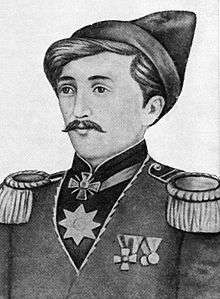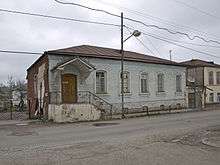Abbasgulu Bakikhanov
| Abbasgulu Bakikhanov | |
|---|---|
 | |
| Born |
Abbasgulu agha Bakhikhanov June 21, 1794 Amirjan, Baku Khanate |
| Died |
May 31, 1847 (aged 52) Wadi Fatima, Jeddah, Saudi Arabia |
| Other names | Gudsi |
| Occupation | writer, historian, journalist, linguist, poet and philosopher |
Abbasgulu Bakikhanov (Azerbaijani: Abbasqulu ağa Bakıxanov Qüdsi) (21 June 1794, Amirjan – 31 May 1847, Wadi Fatima, near Jeddah), also known as Gudsi (Azeri: Qüdsi), was an Azerbaijani writer, historian, journalist, linguist, poet and philosopher; descendant of the ruling dynasty of the Baku Khanate, nephew of the last khan of Baku. He was an officer in the Imperial Russian Army from 1820 and participated in the Russo-Persian War of 1826-1828. He later retired and settled in Quba, but traveled extensively within Russia, meeting important literary figures as Alexander Pushkin.
Early life

According to other sources, Bakikhanov was born on 10 June 1794. His childhood contemporized with a defining epoch in the history of the Caucasus—the era of battles between Russia and Persia over political domination in the region. Bakikhanov was the son of the 9th khan of Baku, Mirza Muhammed II and a Georgian lady Sofia.[1] He began his academic studies at the age of 7 and soon excelled in Persian. In 1813, seven years after the loss of the khanate's sovereignty, the family moved to Quba, where Bakikhanov studied social and life sciences, humanities, and languages. Within the next ten years, he learned Arabic, Turkish, and Russian, followed later by French and Polish.[2] In 1818, he established the first Azeri literary society Golestan-i Iram. His poetry at this early phase displayed Bakikhanov's deep moral and philosophical involvement in Islam. In 1820, he enlisted in the Russian army as an interpreter and got a commission for taking part in suppressing the rebellious Kazikumukh Khanate (present-day southern Dagestan).
In 1826, Bakikhanov married Sakina, daughter of Kalb Huseyn agha, by whom he had two daughters: Zibayi-Nisa and Tughra.[3]
Political and diplomatic career
Bakikhanov actively participated in political life of the Caucasus. He was a member of the Russian diplomatic mission that was in charge of negotiating border issues between Russia and Persia in the 1820s. In 1823, he assisted in gathering ethnographic information for the Description of the Province of Karabakh. In 1828, he was among the Russian military command under General Paskevich that took part in peace negotiations with Persia, which resulted in signing the Treaty of Turkmenchay. He managed to convince Khan Ehsan of Nakhchivan, as well as a number of Kurdish leaders of Persia to ally with Russia. The year after Bakikhanov was awarded the 4th Degree Medal of St. Vladimir for participating in the siege of Kars in the Russo-Turkish War of 1828-1829. For a while he served at the Russian Ministry of Foreign Affairs in Saint Petersburg, and had travelled to Kaunas, Riga, and Warsaw before he retired in 1835 and returned to the village of Amsar near Quba.[4]
Career in education
Bakikhanov's religious views were generally liberal due to major European influences. He criticized fanaticism among the religious masses and the Obscurantism of the clergy. He promoted the Islamic culture in the region and in Russia as a whole. His ultimate goal was to establish a Muslim college in Baku and an Oriental languages school in Tblisi. In 1832, he came up with a project for establishing a major educational institution for Muslims, where subjects would be taught in Russian, Persian, and Azeri. He went further, and wrote a number of textbooks through which students were expected to study. The project was sent to the governor of the Caucasus for approval but unfortunately was disregarded and never looked into. Bakikhanov also translated several fables by Ivan Krylov into Azeri — however, only one has been preserved till nowadays. His greatest accomplishment in the field of education was writing Qanun-i Qudsi, the first Persian grammar manual published in history.
Major works
Riyadh al-Quds (The Holy Garden). Bakikhanov wrote his first book (in Azeri) under religious influence from the Muslim communities of Quba. At the same time, Riyadh al-Quds was Bakikhanov's reflection piece on Shi'a mystic literature, such as Jila al-Uyun by Muhammed Baghir Majlisi.
Golestan-e Eram (The Blooming Flower Garden) is one of his major works (written in Persian) and dedicated to the history of the East Caucasus from Ancient Times to 1813. An English translation of this work has been made by Willem Floor and Hasan Javadi and published by Mage Publishers in 2009.[5]
Ketab-e Asgariyyeh (The Book of Asgar) was Bakikhanov's first fiction book: a love story of two young people, persecuted by the fanatic society they lived in. The book was written in the Persian language.
Qanun-e Qodsi (The Holy Law) was the first book in history entirely dedicated to the grammar of the Persian language. Originally written in Persian in 1831, it was translated into Russian in 1841 and became one of the bases for the development of iranistics in Russia.
Mishkat al-Anwar (The Cresset Niche). This book is an almanach of fables, parables, as well as some quotes from the Qur'an and references to Sufi mysticism overall aimed at preserving social values and morals within society. The book was written in Persian.
Kashf al-Qaraib (The Discovery of the Unknown) was one of the school books written by Bakikhanov in the early 1830s in Persian, where he describes the discovery of the Americas.
Asrar al-Malakut (The Secrets of Heavens) is an introduction to astronomy, written in Arabic.
Other works include Umumi Joghrafya (General Geography), Kitab-i Nasihat (The Book of Admonitions), etc., scientific essays, collected poems, articles, translations of various works into Azeri and Russian, etc.
Death
In 1845, Bakikhanov went on a hajj. On his way to the holy Islamic sights, he was warmly received by the Shah of Persia and was awarded the Shir-e Khorshid, the highest ranking Persian medal. There he also visited Isfahan, Yazd, Shiraz, and Kermanshah. In Constantinople, Bakikhanov had an audience with the Sultan, who showed interest in some of his academic writings, particularly in Asrar al-Malakut, of which he was presented a copy. From there, Bakikhanov went to visit Mecca and Medina. On his way from Medina back to Damascus he caught cholera and died in the small town of Wadi Fatima in Hejaz (present-day Saudi Arabia) in 1847.
Monument
In October 2011 Abbasgulu Bakikhanov's statue was unveiled in Baku, in the settlement of Baku named after Bakikhanov. The park Bakikhanov, where the monument is, was overhauled, and then the monument was erected there.[6]
-

Bakikhanov's Memorial in Baku
References
- ↑ http://nasrinbabanly.wordpress.com/2011/07/08/a-challenging-literary-figure/
- ↑ Studies on Qudsi Archived September 28, 2007, at the Wayback Machine. by G.Bakikhanova (in Russian). Retrieved 29 August 2006
- ↑ Родословная таблица Кубинских ханов. Акты, собранные Кавказской археографической комиссией. — Тифлис, 1875. — Т. VI, ч.II. — pp. 907-908
- ↑ Azeri Literature Archived September 28, 2007, at the Wayback Machine. (in Russian). Fundamental Electronic Library The Russian Literature and Folklore. Retrieved 29 August 2006
- ↑ Willem Floor, Hasan Javadi(2009), "The Heavenly Rose-Garden: A History of Shirvan & Daghestan by Abbas Qoli Aqa Bakikhanov, Mage Publishers, 2009.
- ↑ В Баку воздвигнут памятник Бакиханову